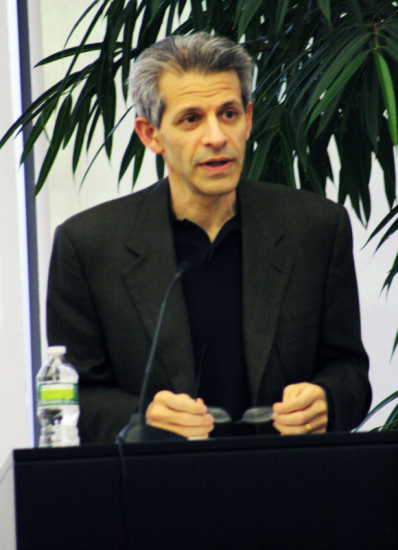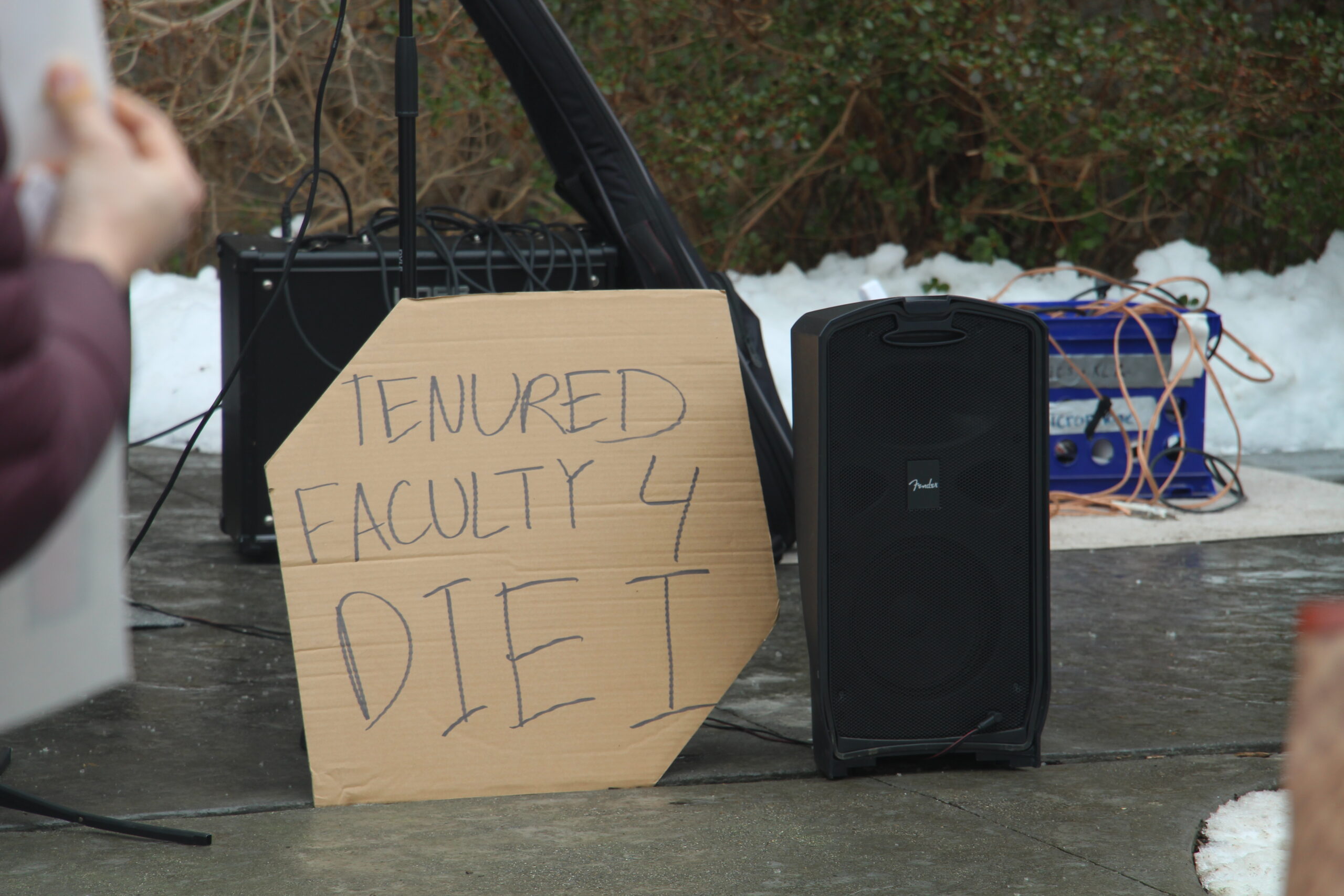
Daniel Goldhagen speaking to Conn students. Photo by Miguel Salcedo.
On Wednesday, former Harvard University political science professor Daniel Goldhagen gave a lecture in Shain Library called “Worse Than War: Understanding Genocide and How to Stop It.” For roughly an hour and a half, Goldhagen spoke slowly, in a deep nasal voice, about genocides: how they begin, why they are perpetrated and supposedly—though I think I must have missed it—why they end. In short, the experience of the lecture was like watching Sophie’s Choice for the first time after coming home from a fun and carefree day at an amusement park. That’s not a bad thing. Genocide is a very serious issue and Goldhagen is correct; it needs to be discussed.
As the man said, “Genocides happen in every corner of the world to every type of people. The numbers in the past one hundred years are staggering. The Turks slaughtered more than a million Armenians in World War I. In the 1930s and 40s, the Japanese killed millions across Asia. In the Soviet Union, the estimated number of deaths in the Gulag camps is beyond eight million. The Germans slaughtered six million Jews and millions more in World War II. In the 1950s and 60s the Communist Chinese killed an estimated thirty million. During the 1970s the Khmer Rouge killed almost two million Cambodians (twenty percent of that country’s population). Bosnia, Rwanda, Congo and Darfur. All told in our time, there have been one hundred million victims of genocide, more than all the combat deaths in all the wars fought during that time in the world. Based on the human toll alone, genocide and mass slaughter are worse problems plaguing humanity than war. We need to understand why.”
He took long pauses between each of those sentences to really let the facts sink into the hearts and minds of his audience. He later went on to say that the United States, by dropping the two atomic bombs on Hiroshima and Nagasaki, committed an act of genocide against the Japanese in World War II.
There were mixed reactions to Dr. Goldhagen. I personally liked two things about him. First, he didn’t just spin a theory like a lot of professors do. He kept the conversation real, thoroughly grounded in historical context. Second, he did a great deal of thorough research to back his claims. This is a guy who stood among about a thousand confessed mass murderers in Rwanda without the presence of any guards. He has done a very admirable job of obtaining and presenting the facts of the Rwandan genocide, and his intention is clearly a noble one.
However, he’s too gung-ho about taking what he believes to be the proper political action to respond to the problem of genocide. What he wants to do, in essence, is to create an international organization that would put a bounty on people who are or are suspected of perpetrating or planning to perpetrate genocides. This would entail putting bounties on people who are perceived as threats by anonymous, and supposedly omniscient, overseers. Given that the world is a big place with many languages and lots of misunderstanding, this is very dangerous. I would suggest that the creation of such an institution, an international organization that is charged with the task of offering rewards for the assassination of individuals whom it does not like is at its core an INSANE solution.
But that was not the only radical and problematic part of Goldhagen’s lecture. If you are going to create an institution whose job is to kill people (which was the same function the SS had, by the way), you need to ask yourself and the world a very important question: is philosophy—even before policy—something that needs to be rooted in the truth of a real world situation, or is it something that can be universally applied to all situations?
If the answer is no, then the centralized policies that the Harvard academics like Goldhagen create and the agencies that enforce them will probably be very effective. If the answer is yes, on the other hand, then one’s attempts to impose a value structure on other people, people who have different ethics, norms, cultures and different fundamental understandings of the world (different not only from us, but from each other) through economic and legal means will not necessarily work.
We are a Western culture that is familiar with enacting policies and laws to establish a system to maintain our notion of what is the “proper order.” Through violence, education and their dialectical product, the social contract, the West built its notions of democracy, personal liberty and freedom from the ground up. Its leaders cannot simply do that for others.
Realistically speaking, the best you can do is to allow others to come to your country, to stay in your homes and allow them to live with you. Expose people from different cultures and regions to the way you live your of life, which is, presumably, the best way to live, so that they may return to their home nations and create the educational, economic and legal (in that order) foundations for their own stand alone systems that will work to improve the standard of living and consensus of ethics for their civilizations. Feudalism must precede nationalism. One cannot create rule of law for a society that does not yet have the educated populace to understand both how a long-evolving system works and the reasons why it operates in an ethical way. As Aristotle said, “No action at a distance.”
In light of what I have just said, I would like to urge a very important point in response to Goldhagen. He maintains, “The status quo is the worst possible situation when it comes to mass murders.” I strongly disagree. The worst case scenario is mass murder that is allowed to take place within a superpower. This is what happened in Nazi Germany, where the fruition of genocide was equated with the most persuasive of political tactics, the most irrational belief the modern age has developed: a sense of patriotism.
The belief in the infinite wisdom and nobility of the state is one of the most dangerous things we face today. Belief in the wisdom of an omnipotent faceless God who insists that he be worshiped in a particular way was the very foundation of the Crusades. It is also the foundation of any jihad. Very similarly, the belief in the wisdom of an anonymous and seemingly omnipotent state, government or legal system was the very reason the Third Reich was so successful. The problem is the predisiposition of men from Western cultures to deal in absolutes, and to entrust to a faceless system with a leader’s job.
Goldhagen is overeager. His point, that killing is easy, does not justify the assassination of individuals, real human beings, by an impersonal institution created by a state or a collection of states. Nor does it justify the facilitation of an institution to make large expenditures of capital to achieve an equivalent goal through monetary means. Most importantly, it does not justify the very foreseeable consequences of creating such an institution. Make no mistake about it, he’s calling for the creation of an international cult of death.
One of the qualities of educated men is the wisdom to know when inaction is favorable to action. In light of Goldhagen’s personal quality of ressentiment and his “oh please” attitude towards philosophy and psychology, I would ask the following questions: if one assembles the organization Goldhagen proposes, to kill potential perpetrators of genocide, would not the members of such an organization, themselves, be eliminationist? Would we rely on such an organization to eliminate its own members? Can one group be entrusted to decide such critical matters? To use the adage attributed to Juvenal, who watches the watchmen?
Furthermore, can one man accrue the necessary life experiences to make definitive normative claims that dictate the policies of how the Western and Eastern superpowers should police the world? Policing ought to be a local endeavor, with an authority figure serving the honorable function of protecting his or her community. When you police at a distance, for people you do not know, you engage yourself in an empty and unrewarding process which fosters the widespread attitude of ressentiment, the phenomenon I believe is the real source of genocide.
If you are not like Goldhagen, “insufficiently educated,” and you, like me, realize that there is in fact good reason to respect psychology and philosophy, and to be well-read in these disciplines, then take a minute to look up “ressentiment” on Wikipedia. In the second paragraph, you’ll find a very good description of the human source of eliminationism, the very phenomenon that Goldhagen claims is the cause of genocide. When I the posed some of the issues I have discussed here as a question, his response was to slyly assert that I did not have an education. No offense to several of my family members, but I think a Harvard education just might be overrated. •










[…] http://thecollegevoice.org/2011/04/04/former-harvard-professor-sheds-light-on-genocide-2/ LikeBe the first to like this […]
Accidentally hit the thumbs up button. This is a pedantic and misguided opinion, further weakened by a confusing and arrogant writing style.
What are you talking about Alex in the last few paragraphs? The only superpowers on earth that are policing the globe are the western nations of the U.S and Europe. The “Eastern superpowers” believe in a policy of non-interference. Hence countries like China or Japan do not start wars like the U.S has done nor have they engaged in covert operations in countries far from their own to destabilize or overthrow the local government. Please feel free to respond Alex,
Best,
Brian
Thanks for reading,
Our main aim is to prevent another HOLOCAUST of happening again,
Today some people claim that the HOLOCAUST never happened, that it is exaggeration,
We prove that it did since we see the YAD VASHEM lists and from this lists we can deduce the destiny of our family,
Jewish Holocaust Never Ends
My father’s family name is Winik. He was born on May 2, 1919. His parents’ house was at 48 Obwodowa street in RIVNE. The address is marked in red on the accurate map from the website http://www.shtetl.org.pl. My father passed away nearly two years ago in Kiryat Haiym in Israel.
About a year ago we found the names of his parents (my grandpa and grandma) and my father’s little sister on the list of Jews of RIVNE ghetto in Yad Vashem. This proves that they perished on 13 July 1942 ,at night, when the RIVNE ghetto was liquidated by the Nazis. All 5355 Jews were shoved into cattle carriages to Kostopil and shot!
Going over the list of Jews in the RIVNE ghetto in the father’s room we found:
• Risia Winik
• Baruch Winik
• Ruchale Winik (15 years old)
• Miriam Reich
• Eli Reich
• Moses Reich (10 years old)
• Deborah Whitman
• Feiga Whitman (1 year old girl)
7 people and a 1 year old baby in a single room!
The other members of my Father’s family, Yossi and Hasia, were most probably no longer alive. A photo of the RIVNE market indicates that the house had been bombed and they were already dead in the early days of the war. According to a witness from RIVNE, the Nazi bombing was very devastating. Shrapnels made holes of a size of a fist! The whole center of RIVNE was ruined. Another witness from RIVNE also points out the Nazi bombing devastation.
My Father was the only survivor from his family of 6 only because he was drafted to the Red Army after the Ribbentrop-Molotov partition of Poland in 1939.
After WW2 had ended, in 1957, since my Father was a Polish citizen, we emigrated from Tashkent in the USSR to Łódź in Poland and in 1960 we made aliyah to Kiryat Haiym in Israel.
Thanks again
Best Regards
Michael Winik